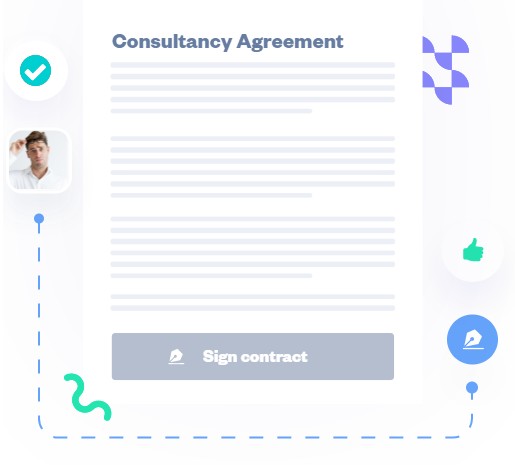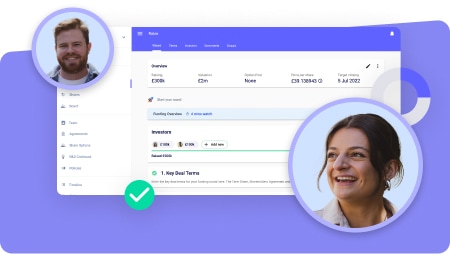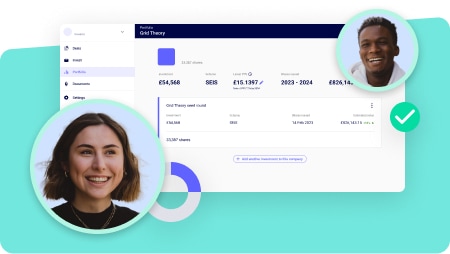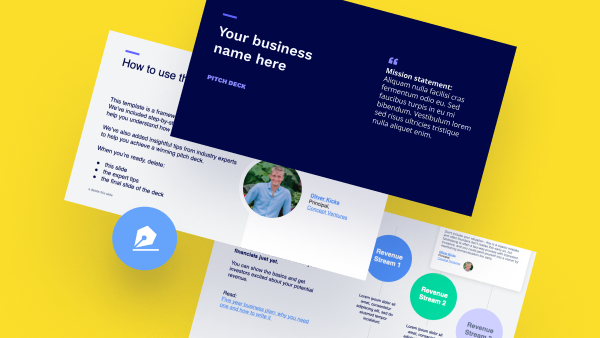Consultancy Agreement - contract template
Create Consultancy Agreements
Sign up contractors and freelancers faster than ever.
Use our template to quickly create a customised contract for self-employed staff.

Trusted by 50,000+ companies
Incredibly fast and easy
Starts from FREE
How to create a Consultancy Agreement
Built by legal experts
Clear contracts for freelancers
Create Consultancy Agreements to set out what you expect from your freelancers, consultants and contractors, and what they can expect from you.
Create contracts for self-employed workers
Include confidentiality and IP assignment clauses
Customise to suit your company

Unlimited free help
Chat online anytime with our experts
Need some help? Not sure whether your contractor needs a Consultancy Agreement or Advisor Agreement? Our legal experts are on hand to chat online, by phone or video call.
Get in touchGet guidance and support
Ask us anything

Team Agreements
Build your team
Use SeedLegals to make hiring your team a breeze. Easily on-board employees, advisors and interns with our contracts, and protect your ideas with NDAs and IP Assignment.
Team AgreementsFAQs - Consultancy Agreements
What is a Consultancy Agreement?
A Consultancy Agreement is a contract between your company and a worker who is self-employed.
You can use a Consultancy Agreement for most freelancers or independent contractors, but not for an employee who will be on your payroll.
A Consultancy Agreement sets out the working relationship between the two parties. It details the rights, responsibilities and duties on both sides.
The contract lists the terms of the working arrangement, including details of the project or duties, how much you’ll pay the worker and how long the arrangement will be in place.
A Consultancy Agreement can also be called:- Consultancy Contract
- Freelance Contract
- Consultancy Services Agreement
- Independent Contractor Agreement
When should I use a Consultancy Agreement?
If you’re paying an external person to work for your business, whether they are consulting for you or working on a project, you should use a Consultancy Agreement.
This Agreement establishes a temporary working arrangement with someone who is self-employed and supplying a service for your company, whether it’s for a specific project or a set amount of time.
The worker could be a freelancer, independent contractor or consultant but they must not be a paid employee of your company. If you need a contract for an employee who will be on your payroll, you should create an Employment Agreement instead.What’s the difference between an employee and a consultant?
‘Consultant’ here also means contractor or freelancer.
An employee is employed by one company
A contractor is a self-employed worker who can work for multiple businesses. (It’s possible an employee could work for more than one company, for example, if they work part-time for two companies).
An employee is paid through the company payroll
A contractor submits an invoice for payment. The company agrees payment terms with the contractor - often a company will agree to pay within 30 days.
An employee has more substantial employment rights
Employees are entitled to the rights set out in the Employment Rights legislation, for example, rights related to time off, Sunday working and dismissal. A contractor has some employment rights but far fewer than an employee.
If a court needs to determine whether a worker is an ‘employee’ rather than an independent contractor, they look at certain factors. These might include:
- whether they have control over their work schedule
- if they’re able to refuse work for you
- how frequently you engage their services
- whether their length of service is longer than two years
- whether they have benefits that an employee has, for example, healthcare, holidays and sickness pay
What's the difference between a consultant, contractor and freelancer?
There’s no clear definition between these labels - it’s up to your worker what they decide to call themselves.
It’s more common for self-employed people in creative professions such as design, marketing or writing to be ‘freelancers’.
‘Contractors’ or ‘consultants’ are often self-employed people who specialise in a particular area, such as IT, HR, finance or law. Someone who is contracting might work on projects for you, while someone who is consulting might do research, create reports and make recommendations.
With SeedLegals, you can create Consultancy Agreements for all the self-employed people you hire, whether they’re consultants, contractors or freelancers.Do I need a Consultancy Agreement for my self-employed workers?
A Consultancy Agreement is a written record of the working relationship between both parties. Because things are clearly defined, it reduces the chance of misunderstandings or potential disputes in the future.
The contract is designed to make sure the worker delivers their services as agreed, within a specified timescale, and that they get the appropriate payment.
As well as the Consultancy Agreement, it’s important for tax purposes that both the worker and the company keep full records of invoices, payments and expenses.What should I include in a Consultancy Agreement?
A Consultancy Agreement sets out in writing the terms that apply to the self-employed person who will be working for you. These terms should include:
- details of the worker
- details of the company
- the worker’s duties while working for you
- start date and end date
- substitution clauses
If the worker can supply a substitute for the work they’re doing for you, and how this must be notified and agreed. - invoice and payment terms
- confidentiality clauses
- IP assignment
The worker assigns IP rights for the work they create to the company. - non-compete agreements
- data protection clauses
- how the contract will be terminated and what happens on termination
- worker’s status
This clause should state that the worker is self-employed and responsible for paying their own taxes. - description of the project or services the worker will supply
This information can be set out in a ‘schedule’ or ‘annex’.
How do I write a Consultancy Agreement?
The easiest way to create Consultancy Agreements for your independent contractors is to use a template and customise it so that it’s exactly what you need.
You can start with a SeedLegals Consultancy Agreement template and choose the terms you need. To get started, log into SeedLegals and go to Agreements. It’s fast and incredibly simple. If you need any help, chat online with our experts.
When your document is ready, send it via SeedLegals to be signed online.
Best of all, we store your documents securely for as long as you need, so you can access them in My Documents anytime. And if you need to create a new Consultancy Agreement in future, you can replicate the terms you’ve used before – you don’t have to start from scratch.Will I need a separate Non-Disclosure Agreement for self-employed staff?
You don’t need a separate NDA if your worker is already covered by a contract that includes confidentiality terms, such as a Consultancy Agreement, Advisor Agreement or Intern Agreement.
The SeedLegals Consultancy Agreement template includes terms that protect your company’s confidential information. You can customise the template to suit your company. To get started, log into SeedLegals and go to Agreements. If you need any help, chat online with our experts.Is a Consultancy Agreement legally binding?
Yes, a Consultancy Agreement is a legal contract and both parties who sign it are bound by its terms.
If you or your contractor breach the terms of the contract, there could be legal consequences. If you think you might need to break the terms of the contract, talk to a legal expert beforehand.Does signing a Consultancy Agreement mean the consultant is outside IR35?
Our legal experts have drafted the SeedLegals Consultancy Agreement to clarify that your worker is self-employed and not an employee, in particular that they’re responsible for their own tax payments. However, this is the minimum you need to do to make sure your worker is outside IR35 regulation.
You’ll need to take extra steps to make sure a worker who signs a Consultancy Agreement can’t be considered to be an employee. For example, you shouldn’t use the same consultant indefinitely, without breaks. And they should use their own IT equipment.
Read more in the section How to avoid consultants from becoming employees in this article:
Consultancy Agreement vs Employment Agreement - what’s the difference?Can I use a SeedLegals Consultancy Agreement for a consultant or freelancer based abroad?
Yes, but it’s important to know that when you create an Agreement with SeedLegals, the contract is governed by and constructed in accordance with the laws of England and Wales.
If your consultant is resident in another country then they might also be covered by the laws of that country.What’s the difference between a Consultancy Agreement and an Employment Agreement?
Consultants are not employees. They are self-employed and responsible for paying their own Income Tax and National Insurance. The consultant’s work for you must be limited to a specific project or a set length of time.
The terms of a contract between your company and a contractor are different to those in an Employment Agreement.
For more detail, take a look at this article:
Consultancy Agreement vs Employment Agreement - what’s the difference?What’s the difference between a Consultancy Agreement and an Advisor Agreement?
Here’s how to work out whether you need to create a Consultancy Agreement or an Advisor Agreement for a person you’re going to work with:
- Do you have a clear definition of the project, timescale or type of work?
On SeedLegals, you’d use a Consultancy Agreement if a worker is self-employed, working on a project with you for a specified amount of time, and you have clear details of the work they'll do. - Will the person’s work mostly be advising or mentoring?
If someone’s work isn’t so clearly defined, for example if they’re a mentor or investor with experience in your industry who will be on hand to offer advice, then you’d use our Advisor Agreement.
An Advisor Agreement sets out that they agree to give advice for the benefit of your business - and details of any reward they’ll receive in return, such as payment or options.
Some companies have a Board of Advisors to provide strategic advice. That’s when you’d want to use an Advisor Agreement.
For more detail on what contracts to use when, take a look at this helpful article:
Seven essential legal docs for start-ups- Do you have a clear definition of the project, timescale or type of work?
You’re in safe hands
Our team of legal and funding experts have helped thousands of entrepreneurs raise money and grow their businesses.
Beautifully organised
Your company's core agreements, all in one place
Secure signatures
Share and collect signatures online via SeedLegals
Backed by real lawyers
Create the exact documents you need at every stage of growth
Serious about security
Your information stays safe and confidential in our secure system
Helpful humans
Talk to one of our friendly team anytime on live chat
Extra protection
Don't worry, our insurance covers claims related to our platform











